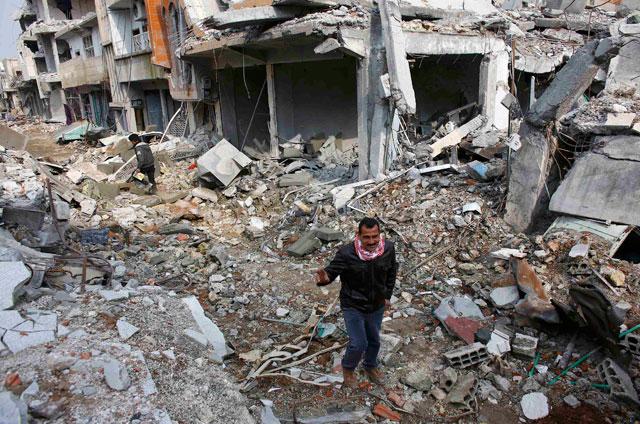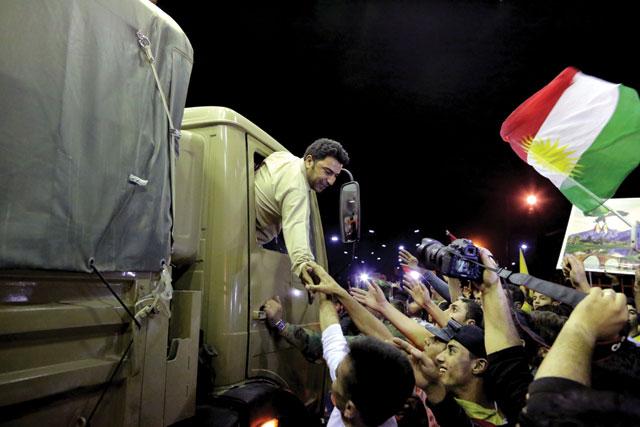You are here
Kobani in ruins after Kurds drive out IS
By AFP - Jan 28,2015 - Last updated at Jan 28,2015

KOBANI, Syria — Pulverised buildings, heavily armed fighters roaming otherwise deserted rubble-strewn streets: the ferocious battle for Kobani has left the Syrian border town in ruins, according to a team of AFP journalists who arrived there Wednesday.
Kurdish forces recaptured the town on the Turkish frontier from the Islamic State (IS) group on Monday in a symbolic blow to the jihadists who have seized swathes of territory in their brutal onslaught across Syria and Iraq.
After more than four months of fighting, the streets of Kobani — now patrolled by Kurdish militiamen with barely a civilian in sight — were a mass of debris and buildings that had in some cases been turned to dust.
Kurdish fighters armed with Kalashnikov assault rifles greeted the journalists with a hail of celebratory gunshots into the air and made the "V" for victory sign.
In one street, an injured fighter sat on the roadside next to an unexploded mortar shell, his leg bandaged and crutches by his side. In another, a bright yellow car was left abandoned, riddled with bullet holes, as two men walked by to inspect the damage.
On Tuesday, Kurdish forces battled IS militants in villages around Kobani, with warnings that the fight was far from over.
Still, the recapture of Kobani appeared to be a major step in the campaign against the IS militants who had seemed poised in September to seize the town, whose symbolic importance had far outgrown its military value.
The victory in Kobani comes as Syrian opposition figures and representatives of the regime of President Bashar Assad began talks in Moscow Wednesday.
But there was little hope that they would make a breakthrough in ending the brutal war that has killed close to 200,000 people since 2011.
Analysts said air strikes by the US-led coalition had been key to the success of the Kurdish People’s Protection Units (YPG) in Kobani because the bombing had taken out some of the jihadists’ heavier weaponry and hitting their supply routes.
“Our forces fulfilled the promise of victory,” the militia said, but cautioned that fighting was not over yet.
A minister in the regional Kobani government said Tuesday that at least half of the town had been destroyed.
The United States had said on Tuesday that Kurdish fighters were in control of about 90 per cent of the town.
But a State Department official warned that the militants, also known as ISIL, were “adaptive and resilient” and no-one was declaring “mission accomplished” yet.
“IS control over its most important strongholds in Syria and Iraq remains intact and there is a lack of a local military force to challenge IS in places like Mosul,” said Aymenn Jawad Al Tamimi from the Philadelphia-based Middle East Forum.
Observers say IS lost nearly 1,200 fighters in the battle, of a total of 1,800 killed, despite outgunning YPG forces with sophisticated weaponry captured from Iraqi and Syrian military bases.
The combat also sparked a mass exodus, with some 200,000 people fleeing across the border into Turkey.
But Turkish security forces on Tuesday fired tear gas and water cannon to push back people approaching the barbed wire fence.
The border remained closed Wednesday.
“We won’t let any refugees cross until further notice,” an official from Turkey’s disaster management agency AFAD told AFP.
Turkish authorities were working to move hundreds of refugees from Kobani to a new camp in the southeastern border town of Suruc which is able to accommodate up to 35,000 people.
It is the biggest-ever refugee camp opened by Turkey, which has taken in 1.7 million Syrian refugees since the Syrian conflict erupted in 2011 as a popular uprising against Assad.
Idris Nassan, an official with the Kobani regional government, said Tuesday the authorities were urging people not to return to their homes as at least 50 per cent of the city was destroyed.
“There is no food, no medicine. We don’t have electricity or water.”
The US official said many foreign fighters — including Australians, Belgians, Canadians and Chechens — were among the dead jihadists.
With the eyes of the international media watching, the jihadists “wanted to raise the largest flag they ever made over Kobani”, the official said.
Related Articles
The Islamic State (IS) jihadist group has lost ground in the Syrian border town of Kobani, where Kurdish fighters now control more than 60 per cent of territory, a monitoring group said Saturday.
Sheets meant to hide residents from snipers' sights still hang over streets in the Syrian border town of Kobani, and its shattered buildings and cratered roads suggest those who fled are unlikely to return soon.
Heavily armed Iraqi peshmerga fighters were set Wednesday to reinforce fellow Kurds defending the Syrian border town of Kobani from the Islamic State group, as anti-regime rebels also joined the battle.
















